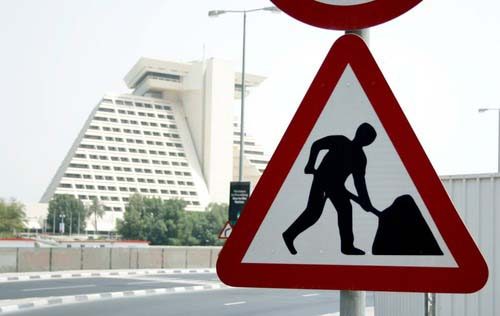
Both Qatar Foundation (QF) and the Qatar 2022 Supreme Committee (Q22) this week have announced the adoption of workers’ charters that, if enforced, could go a long way in ensuring the health and safety of expats employed in the nation’s construction and service industries.
The news comes at a time when Qatar is embarking upon numerous mega-projects in the run-up to the 2022 World Cup, such that more than half a million more expats will come here to work on these jobs.
The announcements were also made as criticism of Qatar’s labor record is reaching a fever pitch, with an international trade union calling on FIFA to revoke the country’s hosting rights for the Cup.
Charter details
Both charters appear to go above and beyond Qatari law by incorporating international best practices to ensure workers are not exploited during the recruitment process, while on the job, or when they’re heading home.
QF’s charter includes fire safety precautions, diagrams of appropriate accommodation layouts, nutrition and food safety guidelines and rules about paid overtime.
In a statement, QF said:
Among the many unfair employment practices that Qatar Foundation is determined to curb are overcrowded living conditions, and unethical recruitment processes.
For Q22, the charter requires that workers engaged directly or indirectly on World Cup projects enjoy health safety, equality in terms of rights irrespective of belief, nationality ethnicity and religion, access to accurate information regarding workers’ rights, and safer living conditions, Dario Cadavid, assurance and integration senior manager of Qatar 2022 Supreme Committee, said while speaking at the Institution of Occupational Safety and Health (IOSH) Middle East Conference in Qatar this week.
Questions
How effectively the two organizations will be able to enforce their respective charters remains to be seen.
QF is setting up a special regulatory body, the Workers’ Welfare Department, to regularly screen and assess contractors. And officials from both groups have said they will terminate contracts with companies found flouting the laws.
Qatar is also fielding some criticism from residents who ask why only certain projects will see labor improvements, while employees of other companies continue to suffer. One commentator on Doha News called the strategy “an appeasement to the outside world.”
But officials have said the charters are a step in the right direction and that change will come to Qatar, but not overnight.
Saad Al Muhannadi, Vice President of QF’s Capital Projects and Facilities Management, said:
“We are mindful of the challenges that lie ahead as the nation undergoes constant change. Implementation, and the elimination of unfair practices, will not be achieved overnight. This is a process that will take time. The commitment and collaboration of all involved, however, will help us to achieve the success we are working towards.”
Here’s a copy of the Qatar Foundation Mandatory Standards of Migrant Workers’ Welfare.
Thoughts?
Credit: Photo by Bob R.







